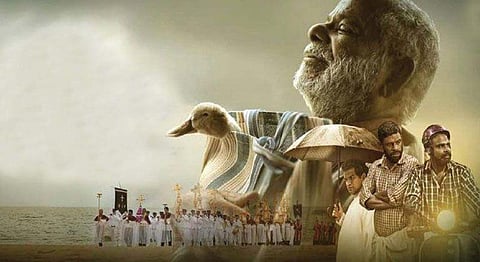
- HOMEGROWN WORLD
- #HGCREATORS
- #HGEXPLORE
- #HGVOICES
- #HGSHOP
- CAREERS
- ABOUT US
- CONTACT US

Lijo Jose Pellissery is known for his keen observations of human behaviour portrayed with such realism on the screen that you momentarily forget you’re watching actors. Pellissery kicked up a storm with Angamaly Diaries that caught the attention of a nation-wide audience. And again, with Ee.Ma.Yau he has made a mark that other quality-content writers and filmmakers will have to work hard to fade.
Looking at the plot simply without any spoilers, what we see unfolding is a series of events following the death of Vavachan Mestri (Kainakiri Thankaraj) and his funeral, or attempts at hosting a funeral by his son, descend into chaos. Ee. Ma. Yau. the shorthand of Eeso Mariyam Ouseppe (Jesus, Mary and Joseph) is prayer whispered into the ears of people on their death beds in some Christian communities.
More than death, what takes centre stage in the film is the impact it has on the community as it comes together and then breaks apart. As Pellissery and writer PF Mathew’s barrel of monkeys spills over to show the audience the politics and drama that surrounds death through unique characters, we are witness to how everyone involved has their own suspicions and motives approaching the funeral, with the Vavachan’s family playing their part of mourners. The film uses dark humour throughout and whether it is the Sherlock Holmes-esque Vicar, the local gossip, money lender or Vavachan’s wailing wife in mourning – each character you come across brings something different the table, making them memorable performances by all involved.
Chemban Vinod earnestly plays the role of Eeshi, Vavachan’s son, who struggles to give his father the spectacular funeral he promised minutes before the old man’s unforeseen death. You can see moments of care and tenderness between father and son in the early scenes of the film as they enjoy a couple of drinks together with Vavachan singing, dancing and reminiscing about his own father’s lavish and memorable funeral procession. With only a duck, his life savings in the form of invalid currency notes post demonetisation and bottle of arrack in his possessions, he leaves his family with little for the preparations.
Emotions continue to bubble for Eeshi and finally erupt as all his efforts of putting together his father’s funeral fall apart – in one scene it is quite literal as the body falls out of the coffin – and what we see is the son’s frustrations pushed to the limit as he ends up taking matters into his own hands and buries his father. The scene is captured beautifully against the perfect backdrop of heavy rain. The coastal nature of the village is a constant element used in the framing of the scenes, something you don’t forget but is never an overbearing aspect of the film. The natural elements, be it the lashing rain, sandy beach or waving leaves of tall palms with the strong winds, are all used by cinematographer Shyju Khalid as part of the frames to visualise the emotions of the characters you watch in the each scene. Khalid follows the characters keenly, capturing the finer nuances of the actors’ portrayals – this along with the opening wide shot of the funeral procession prove that Pellissery has put Khalid’s talents to the best use.
Amidst all the chaos of the funeral in question, one thing that truly stands out (and is strangely relatable) is how the entire event is treated like a transaction or a rehearsal of sorts by the family members themselves, as each member is expected to perform certain expected roles, for example, Pauly Valsan as the wailing widow lamenting the loss of her husband despite the fact that he would leave unannounced for long periods of time or that he had a second family, including a wife and children. The urgency of organising a successful funeral overshadows the reality of death. Leaving very little room for anyone to even acknowledge, let alone mourn or grieve the passing of a loved one.
In the film, Pelissery gives us a satirical take on death and its consequences without tipping into the waters of insensitivity. Ee. Ma. Yau, along with Pellissery, is among this year’s, if not modern Indian cinema’s finest films. We often forget that there’s more to Indian cinema than the Hindi film industry. As the Bollywood blockbusters continue to disappoint, we’re finally beginning to pay attention to the gems of filmmaking from the rest of the country.
If you liked this article we suggest you read:
